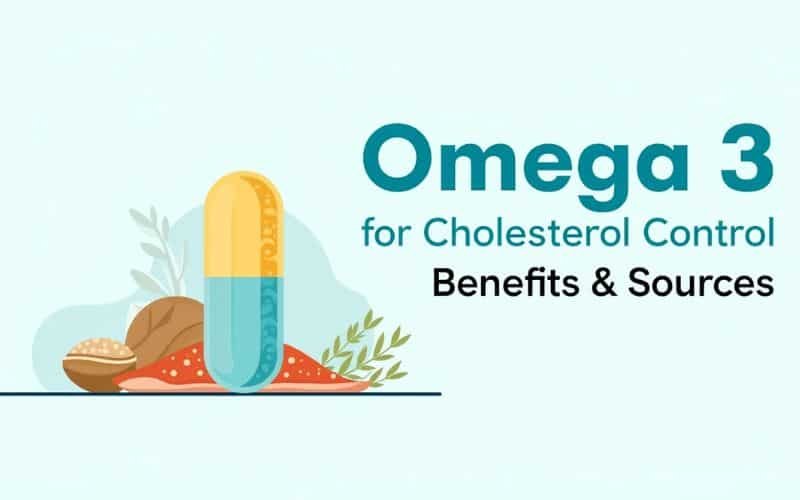Introduction
Maintaining heart health is a growing concern in Pakistan, where sedentary lifestyles and rich diets are contributing to rising cholesterol levels. One natural and powerful ally in this battle is omega-3 fatty acids. Known for their heart-protective properties, omega-3s are especially useful in managing cholesterol—a leading cause of cardiovascular diseases in the region.
This guide explores omega 3 for cholesterol control in the Pakistani diet, with culturally relevant food sources, supplement options, meal ideas, and actionable expert tips based on both science and local dietary habits.
What Is Omega-3?
Omega-3 fatty acids are polyunsaturated fats essential for many bodily functions, especially heart and brain health. Since the body can’t produce them on its own, they must be obtained from food or supplements.
Types of Omega-3:
- ALA (Alpha-Linolenic Acid): Found in plant sources like flaxseeds and walnuts.
- EPA (Eicosapentaenoic Acid): Found mainly in oily fish.
- DHA (Docosahexaenoic Acid): Also present in fish and plays a role in heart and brain function.
How Omega-3 Works in the Body
Omega-3s reduce inflammation, regulate heart rhythm, and improve the balance of cholesterol by:
- Lowering triglycerides
- Raising HDL (good cholesterol)
- Reducing the buildup of plaque in arteries
How Omega-3 Helps With Cholesterol
Numerous studies support the effectiveness of omega-3 in controlling cholesterol levelsf and improving heart health.
🔬 Key Benefits:
- Reduces Triglycerides: According to the American Heart Association, omega-3 can lower triglycerides by 20–50%.
- Boosts HDL (Good) Cholesterol: Though modest, omega-3s help increase HDL levels, which carry cholesterol away from arteries.
- Reduces Plaque Formation: DHA and EPA help prevent the buildup of fatty deposits in blood vessels.
Omega-3 Sources in the Pakistani Diet
You don’t need imported superfoods — many local Pakistani ingredients are rich in omega-3 and can be easily added to your meals.
🐟 Fish:
- Rohu (Rahuu): Commonly found in Pakistani rivers; contains moderate levels of omega-3.
- Sardines (available canned): Budget-friendly and high in DHA/EPA.
- Salmon (if accessible): High in EPA/DHA but relatively expensive.
🌱 Seeds:
- Flaxseeds (Alsi): Rich in ALA; can be ground and added to atta or lassi.
- Chia Seeds: Good plant-based source for vegetarians.
🌰 Nuts:
- Walnuts (Akhrot): Excellent snack and rich in ALA.
🛢️ Oils:
- Mustard Oil (Sarson ka tel): Traditionally used and contains omega-3.
- Canola Oil: Mild taste and good for daily cooking.
🥘 Incorporating Into Desi Meals:
- Add ground flaxseed to whole wheat roti dough
- Prepare grilled fish tikka or masala sardines
- Sprinkle chia seeds on dahi or porridge
- Use mustard oil for fish curry or bhuna recipes
Omega-3 Supplements in Pakistan
For those who don’t consume enough omega-rich foods, supplements can be a reliable alternative.
💊 Common Options:
- Fish Oil Capsules: Widely available in pharmacies; choose purified brands.
- Cod Liver Oil: Also contains vitamins A & D.
- Algae-Based Omega-3: Ideal for vegetarians; offers DHA without fish.
🛍️ How to Choose a Quality Supplement:
- Look for IFOS or GOED certification
- Choose molecularly distilled for purity
- Prefer brands with EPA & DHA combination
🔢 Recommended Dosage:
- 500–1,000 mg of EPA+DHA per day for general heart health
- 2,000–4,000 mg per day for those with high triglycerides (consult a doctor)
Practical Meal Ideas for Cholesterol Control
Here’s how a desi diet can be optimized for omega-3 and heart health:
🗓️ Sample Daily Plan:
Breakfast:
- Whole grain roti with flaxseed
- Boiled egg
- Green tea
Lunch:
- Grilled sardine curry with mustard oil
- Brown rice or chapati
- Side of cucumber raita
Snack:
- Handful of walnuts
- Lassi with ground chia seeds
Dinner:
- Grilled rohu or salmon
- Mixed vegetable sabzi
- Whole wheat roti
Expert Tips & Common Mistakes
✅ Do:
- Store flaxseeds in airtight containers
- Add omega-3 to meals rather than snacks only
- Grill or steam fish to retain nutrients
❌ Avoid:
- Deep frying omega-3 rich foods (destroys fatty acids)
- Overconsuming omega-6 oils (e.g., sunflower, corn oil)
- Ignoring serving size of supplements
Who Should Be Careful?
While omega-3 is generally safe, some people should proceed with caution:
🩺 Consult Your Doctor If:
- You’re on blood thinners (e.g., warfarin)
- You have bleeding disorders
- You’re pregnant or breastfeeding
FAQs
Can vegetarians in Pakistan get enough omega-3?
Yes, through flaxseeds, chia seeds, walnuts, and algae-based supplements.
How long does it take to see results in cholesterol levels?
6–12 weeks of consistent omega-3 intake may show improvements, especially in triglyceride levels.
Can omega-3 replace cholesterol medication?
Not entirely. It can complement medication but not replace it. Always consult your cardiologist.
Conclusion
Omega-3 is a simple yet powerful nutrient to manage cholesterol, especially in the Pakistani diet, which already includes many beneficial traditional foods. Whether you opt for grilled fish, flaxseed rotis, or certified supplements, incorporating omega-3 into your daily meals can significantly improve heart health.
👉 Talk to your doctor or nutritionist before starting any supplement and start with small, sustainable changes to your daily eating habits.










Add comment
You must be logged in to post a comment.